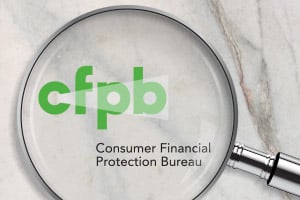 The publication makes official the bureau’s policy statements exploring third-party debt collectors’ role in collecting on behalf of nursing homes and the liability that could occur under laws enforced by the CFPB; however, it is not clear how prevalent the issue is.
The publication makes official the bureau’s policy statements exploring third-party debt collectors’ role in collecting on behalf of nursing homes and the liability that could occur under laws enforced by the CFPB; however, it is not clear how prevalent the issue is.
09/27/2022 10:15 A.M.
4.5 minute read
The Consumer Financial Protection Bureau’s policy statements highlighting nursing home bills and debt collection are now published in the Federal Register.
The policy statements outline a three-prong effort in partnership with the Centers for Medicare and Medicaid Services (CMS).
The effort includes:
- An issue spotlight from the CFPB highlighting “some of the difficulties and experiences heard from caregivers about being pursued over friends’ or family members’ alleged debts from nursing home facilities.”
- A joint letter from the CFPB and CMS confirming that a nursing care facility may not require that a third-party caregiver personally guarantee payment of a nursing home resident’s bills as a condition of the resident’s admission to the facility.
- A new Consumer Financial Protection Circular discussing conditions that violate the Nursing Home Reform Act (NHRA) and that subsequent attempts to collect debts from caregivers may violate the Fair Debt Collection Practices Act and Fair Credit Reporting Act.
It is unclear from the CFPB’s reports the expanse of the issue of FDCPA and FCRA violations related to collecting debts from caregivers.
ACA International issued a response to the report for members, which was also quoted in MarketWatch.
“ACA International members have strong compliance management systems that take into account contractual and legal obligations when working with reputable creditors,” said CEO Scott Purcell. “We are unaware of a pattern of abuse or problems within nursing home debt collection practices.”
Of note, according to the news release from the CFPB, “while the CFPB does not enforce the Nursing Home Reform Act, contract terms that violate the [a]ct’s ban on requesting or requiring a third-party guarantee of payment are unenforceable. This means that subsequent collection of debts from those contracts may violate the consumer financial protection laws the CFPB does enforce, including the Fair Debt Collection Practices Act and its prohibition of ‘any false, deceptive, or misleading representation or means in connection with the collection of any debt.’”
The effort is documented as part of the bureau’s new enforcement strategy known as “Consumer Financial Protection Circulars.”
The circulars are “policy statements under the Administrative Procedure Act and will be released publicly to increase transparency for the benefit of the public and regulated entities,” according to the CFPB.
They are published on the CFPB website and in the Federal Register with Director Chopra’s authorization.
The question presented in the CFPB’s latest circular is “Can debt collection and consumer reporting practices relating to nursing home debts that are invalid under the Nursing Home Reform Act violate the FDCPA and FCRA?”
The CFPB says yes.
Under the NHRA, enacted in 1987, a nursing facility may not condition a resident’s admission or continued stay on receiving a guarantee of payment from a third party, such as a relative or friend. Contractual provisions that violate that prohibition are illegal and unenforceable. As detailed in the circular, certain practices related to the collection of nursing home debts that are invalid under the NHRA and its implementing regulation violate the FDCPA and FCRA, according to the CFPB.
The CFPB reports third-party debt collectors working with nursing home clients may be subject to the false representation components of the FDCPA when collecting that debt.
“A debt collector may violate the FDCPA’s prohibition on misrepresentations by making a false, baseless allegation in a lawsuit that a third party engaged in financial wrongdoing as a means to hold them personally liable for a resident’s debts,” the CFPB notes.
The CFPB adds the FCRA into the mix by reminding collectors that those furnishing data based on “illegal contract terms” may be subject to violations of the law.
“Thus, a debt collector who furnishes information about nursing home debts, or a consumer reporting company that includes such information in a consumer report, may violate FCRA and Regulation V if those debts are invalid and unenforceable under the Nursing Home Reform Act, its implementing regulation, or one of its state law analogues. A furnisher or consumer reporting company also violates FCRA or Regulation V if it fails to meet its dispute obligations with respect to information related to such debts,” according to the CFPB.
ACA Insights
Compliance with the FCRA and FDCPA are at the core of ACA members’ compliance policies, and medical debt collections have extra steps for collection and credit reporting.
The prevalence of FCRA and FDCPA violations related to the collection of nursing home medical debts is unclear and the CFPB’s reports lack specific data showing this trend. It needs additional context and examples of supposed violations and nursing home medical debt collections to inform the industry of compliance best practices it may need to consider.
A Kaiser Family Foundation (KFF) and National Public Radio report found that “about one in seven adults who have had health care debt say they’ve been threatened with a lawsuit or arrest.”
KFF studied some local trends on these lawsuits. For example, in Monroe County New York, where Rochester is located, 24 federally licensed nursing homes filed 238 debt collection cases from 2018 to 2021 seeking almost $7.6 million, according to the report. Several nursing homes did not file any lawsuits in that period.
However, nationally, lawsuits against families for nursing home debt are “not a common occurrence,” Beth Martino, a spokesperson for the American Health Care Association, the largest nursing home industry group, told Kaiser Health News.
If you have executive leadership updates or other member news to share with ACA, contact our communications department at [email protected]. View our publications page for more information and our news submission guidelines here.
 The publication makes official the bureau’s policy statements exploring third-party debt collectors’ role in collecting on behalf of nursing homes and the liability that could occur under laws enforced by the CFPB; however, it is not clear how prevalent the issue is.
The publication makes official the bureau’s policy statements exploring third-party debt collectors’ role in collecting on behalf of nursing homes and the liability that could occur under laws enforced by the CFPB; however, it is not clear how prevalent the issue is.













